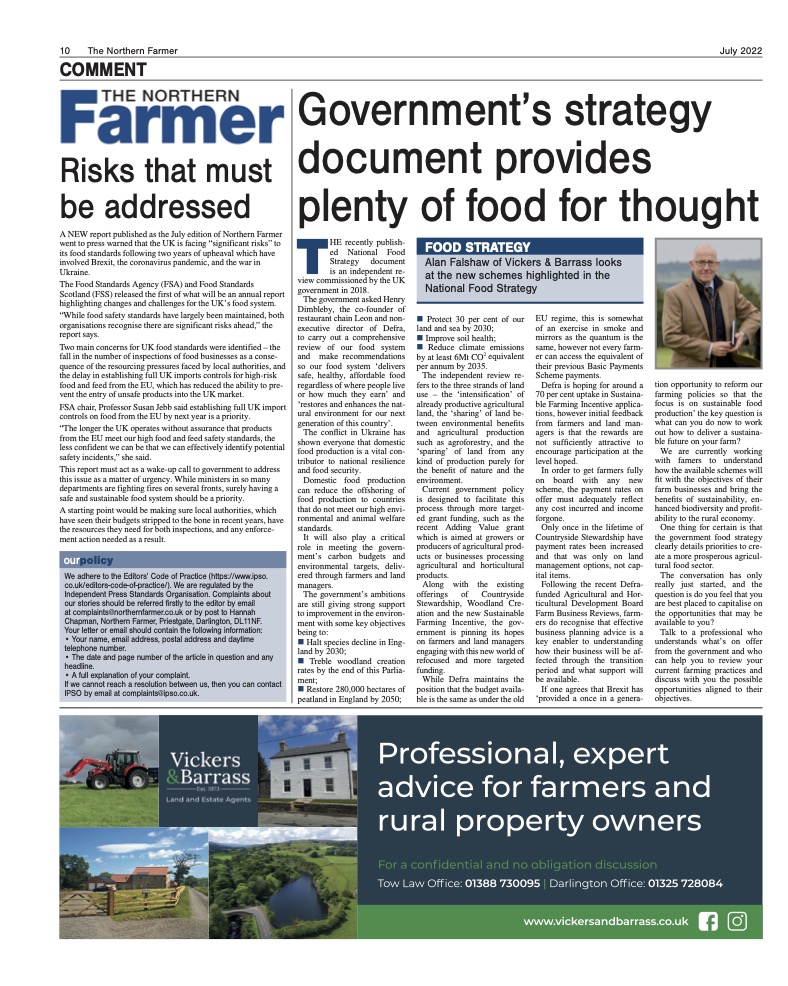The recently published, (June 13 2022), food strategy document is an independent review commissioned by the UK government 2018. The government asked Henry Dimbleby the co-founder of restaurant chain Leon and non-executive director of Defra to carry out a comprehensive review of our food system making recommendations so that our food system delivers a safe healthy affordable food regardless of where people live or how much they earn” and “restores and enhances the natural environment for our next generation of this country”
The conflict in Ukraine has shown everyone that domestic food production is a vital contributor to national resilience and food security. Domestic food production can reduce the offshoring of food production to countries that do not meet our high environmental and animal welfare standards. It will also play a critical role in meeting government’s carbon budgets and environmental targets, delivered through farmers and land managers. The governments ambitions are still giving strong support to improvement in the environment with some key objectives below.
- halt species decline in England by 2030
- treble woodland creation rates by the end of this Parliament
- restore 280,000 hectares of peatland in England by 2050
- protect 30% of our land and sea by 2030
- improve soil health
- reduce climate emissions by at least 6Mt CO2 equivalent per annum by 2035
The independent review refers to the 3 strands of land use, the “intensification” of already productive agricultural land, the “sharing” of land between environmental benefits and agricultural production such as agroforestry and the “sparing” of land from any kind of production, purely for the benefit of nature and the environment. Current government policy is designed to facilitate this process through more targeted grant funding, such as the recent “Adding Value” grant which is aimed at growers or producers of agricultural products or businesses processing agricultural and horticultural products. Along with the existing offerings of Countryside Stewardship, Woodland Creation and the new Sustainable Farming Incentive, the government is pinning it hopes on farmers and land managers engaging with this new world of re-focused more targeted funding. While DEFRA maintain the position that the budget available is the same as under the old EU regime, this is somewhat an exercise in smoke and mirrors as the quantum is the same however not every farmer can access the equivalent of their previous Basic Payments Scheme payments.
DEFRA are hoping for around a 70% uptake in Sustainable Farming Incentive applications, however initial feedback from farmers and land managers is that the rewards are not sufficiently attractive to encourage participation at the level hoped. In order to get farmers fully on board with any new scheme the payment rates on offer must adequately reflect any cost incurred and income forgone.
Only once in the life time of Countryside Stewardship have payment rates been increased and that was only on land management options not capital items. Following the recent DEFRA funded Agricultural and Horticultural Development Board Farm Business Reviews, farmers do recognise that effective business planning advice is a key enabler to understand how their business will be affected through the transition period and what support is available. If one agrees that Brexit has provided a once in a generation opportunity to reform our farming policies so that the focus is on sustainable food production’ the key question is what can you do now to work out how to deliver a sustainable future on your farm?
We are currently working with famers to understand how the available schemes will fit with the objectives of their farm businesses and bring the benefits of sustainability, enhanced biodiversity and profitability to the rural economy.
One thing is for certain that government’s food strategy clearly details priorities to create a more prosperous agricultural food sector, the conversation has only really just started, and the question is do you feel that you are best placed to capitalise upon the opportunities that may be available to you?
Talk to a professional who understand what’s on offer from the government, they can help you review your current farming practices and discuss with you the possible opportunities aligned to their objectives.
Tel Tow Law Office 01388 730095.





